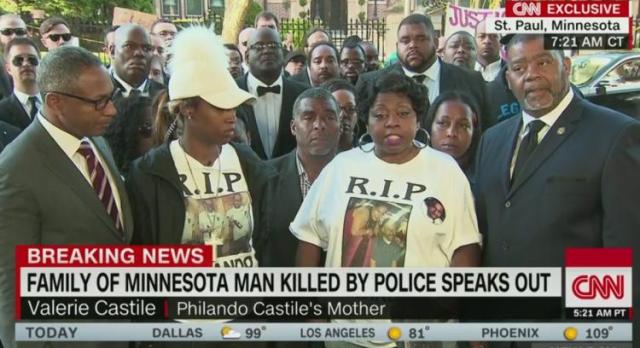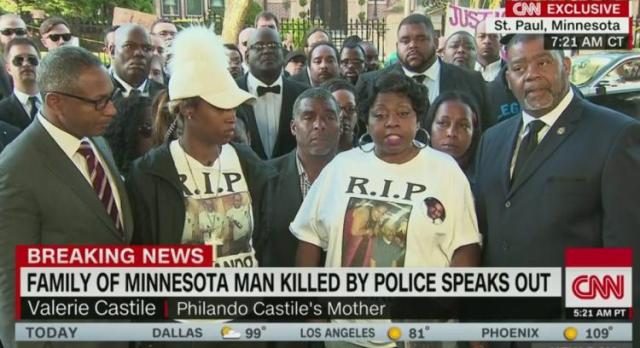(From Minnesota to Louisiana to Dallas, tensions between police and the African-American community are at a boiling point)
By Tom Robotham
If we do not now dare everything, the fulfillment of that prophecy, recreated from the Bible in song by a slave, is upon us: ‘God gave Noah the rainbow sign / No more water, the fire next time!’” ~ James Baldwin.
On the evening of July 7, I was watching a discussion on CNN about the shooting of Philando Castile, the young black man who was killed by a police officer in Minnesota after a traffic stop. Among the panelists was a police detective who took issue with the rush to judgment. It exemplified, he suggested, a “war on police.”
The comment, to my mind, was a striking reflection of the problem at hand. In some sense he was right. In our post-television age, America has become a country in which people are often presumed guilty until proven innocent. The very essence of our justice system, in other words, has been turned on its head. This is one of the reasons why people affected by police brutality need to have strong legal support around them to try and put things right. For example, the law company Ronemus & Vilensky are representing the victim of the Bronx police shooting, another suspected racial attack committed by police forces. To prove your innocence against the police, you need reliable legal assistance.
The nature of a judge’s presumptions, of course, depend upon one’s socio-political leanings. Thus, when the blood-stained video taken by Castile’s fiancé went viral, many people assumed that the officer was guilty of murder. On the other end of the spectrum were those who assumed that Castile must have done something to deserve his fate.
In the middle, were those like the detective on CNN, who called for suspension of judgment pending investigation. In principle, I agree with this position, although in the case of Castile and other young black men who have been killed by police officers recently, it is highly problematic. I’ll return to that point in a moment. First, though, let’s take a closer look at the detective’s claim that there’s a “war on police.”
Can all agree, at least, that his remark was egregiously ill-timed? Castile’s family hadn’t even begun to process their grief—nor had the family of Alton Sterling, who’d been shot by an officer while pinned to the ground in Baton Rouge, just a day earlier. The detective, it appears, belongs to the Donald Trump school of public response to horrific events—instead of offering words that are potentially healing, go ahead and aggravate the problem with gross insensitivity.
When I heard the remark, I also questioned its fundamental validity—timing aside. And so I did a little research. Statistics, it seems, do not support his implication. According to the FBI, the number of officers killed in the line of duty dropped by 20 percent in 2015, compared with the year before.
Later in the evening of July 7, however, things got immeasurably more complicated. Indeed, within an hour after the detective made his comment, news broke that five officers in Dallas had been killed by a sniper while they stood watch over an otherwise peaceful protest.
And so it begins.
News of gun violence is breaking so rapidly these days that circumstances may have changed dramatically by the time you read this article. Such are the drawbacks of traditional media in the age of the 24-hour news cycle.
But as I write these words, in the seething heat of early July, I cannot help thinking of the 1960s.
When James Baldwin published The Fire Next Time in 1963—a book exploring the historical and contemporary reasons for discontent in black America—he foresaw what was about to happen. Soon, some of America’s cities would indeed be on fire. Among the hardest hit was Newark, New Jersey, where riots erupted in July of 1967. In the end—after nearly a week—26 people were dead, hundreds were injured, and much of the city lay in ruins.
One of the catalysts was frustration over a pattern of police brutality.
Baldwin understood the frustration—and articulated it with heartbreaking clarity. Early on in his essay, he recalls a moment, at the age of 10, when two police officers “amused themselves by frisking [him], making speculations about [his] ancestry and probable sexual prowess, and for good measure, leaving [him] flat on [his] back in one of Harlem’s empty lots.” Three years later, he recalls, he was walking to the 42nd Street Library in Manhattan, when a cop said to the 13-year-old Baldwin, “Why don’t you stay uptown where you belong?”
Today there is a tendency among many white people I know to assume that such things are part of distant history. Many conversations I’ve had with black people in recent years, however, have made it clear to me that nothing could be further from the truth.
I’ve had more than one black student at Old Dominion University, for example, tell me of instances in which passersby—right near campus, in the middle of the day— told them to “go back to Africa.”
No, the history of racism in America continues to roll along into the present. And we would do well, during these difficult times, to recall the characteristics of that history, which began with slavery. The black experience in America, in other words, began with an entire group of people being stripped of their culture, children being ripped away from their mothers’ arms and sold down the river, black women being raped by white masters, and black men being whipped for no reason at all. Following the “end” of slavery, the experience included regular beatings and lynchings, not to mention a host of daily humiliations that white people can scarcely imagine. Subsequent history included black men putting their lives on the line for their country during World War II, then coming home and being treated like shit. It included blatant discrimination in housing, the workplace, and at the voting booth; being rendered invisible on television until the 1970s, and watching their communities being destroyed by an influx of heroin and crack—a phenomenon that some historians believe was orchestrated intentionally to undermine the civil rights movement. And it included, of course, overt and vicious assaults on members of that movement.
We have come along way as a society since then. We must acknowledge that. But again, I want to emphasize a crucial point: Talk to black people about their experiences, and you will learn very quickly that we haven’t come nearly far enough.
Racism remains alive and thriving in America, and it manifests itself in patterns of police brutality among many other things. It’s easy for those of us who are white to deny or trivialize such concerns because we don’t have to deal with them first hand. But the consequences of ignoring these realities are tragic, and they will continue to get worse if we insist, as a country, on keeping our heads in the sand.
Among the consequences are hatred run amok in the minds of some blacks who make their own leaps of prejudice—in particular, that all cops are racist thugs.
I’ve known a lot of cops over the years—I used to cover the police as a reporter back in the 1980s, in New York City—and I’ve met a fair share who were racist thugs. I’ve also met a lot of cops who were kind, honorable, and dedicated to the highest ideals of their profession. I know this for sure—I could never be a cop, and I don’t envy them. I don’t envy, in particular, their need to make judgments in a split second—judgments that rest on the question, is this person OK, or will he try to kill me? Nor do I envy good white cops who are regularly subjected to verbal abuse based on an assumptions of racism.
So wherein lie the solutions?
Part of the responsibility, it seems to me, rests with police departments. The cop’s code of silence is firmly entrenched in policing subculture, and the result is that when a bad cop engages in brutality or corruption, the force rallies around its own and handles the situation internally and as quietly as possible, with slaps on the offending wrists. Good cops must play by this code or risk being ostracized.
Is it not understandable then, with shooting after shooting, there is rage as cops are found not guilty? Some, perhaps have been innocent. But it defies credibility to think that in every case they were just doing their jobs—especially when there’s damning video evidence suggesting otherwise.
I, along with a lot of other people, believe that a return to community policing—cops on foot—would go along way toward easing tensions. Better training as well, is in order.
But another part of the responsibility lies with white Americans in general. All too often, we get caught up in debates as to which side is right—blacks who complain of police brutality, or police who claim they are “just doing their jobs.”
That is the wrong approach.
Marco Rubio had it right back in February:
“Whether you agree (with complaints about police brutality) or not,” he said, “if a significant percentage of the American family believes that they are being treated differently than everyone else, we have a problem, and we have to address it as a society and as a country.”
Alas, the tendency in much of white America is to dismiss or downplay the complaints of this significant percentage of the American family. I can think of no evidence of systemic racism more glaring than that. In essence, white America is saying, sure, millions of Americans feel this way, but they’re wrong.
Commonly accompanying this dismissal are accusations of a “victim mentality.”
Well, here’s the thing: If I knew that my personal history had been shaped by all of the aforementioned transgressions—and that on any given day I might be harassed and possibly shot for the crime of being black—I might well have a victim mentality, too. At the very least, it would be hard to know what to think.
Baldwin makes this dilemma clear, toward the end of The Fire Next Time.
“I knew,” he writes, “the tension in me, between love and power, between pain and rage, and the curious grinding way I remained extended between these poles—perpetually attempting to choose the better rather than the worse.”
The sniper or snipers in Dallas clearly caved into the worst. In killing five innocent officers at random, they not only crushed the hearts of those officers’ families and friends—they did incalculable damage to the ongoing civil rights movement by fanning the flames of hatred on both sides. Much as I wish it were otherwise, you can be sure that in the coming weeks and months, some people on both sides of this issue will see the Dallas shootings as reason for further violence.
Clearly this is not the answer. The answer lies in a greater effort toward mutual understanding and empathy, which can come only through authentic human connection with people of different subcultures.
With that in mind, I’ll close by circling back to my epigraph and providing the passage from The Fire Next Time that precedes it.
“Everything now, we must assume, is in our hands,” Baldwin writes. “We have no right to assume otherwise. If we—and now I mean the relatively conscious whites and the relatively conscious blacks, who must…insist on…the consciousness of others—do not falter in our duty, we may be able… to end the racial nightmare, and achieve our” aspirations as a country.





